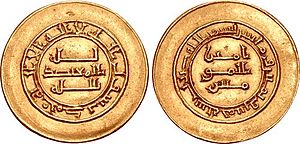
Back أحمد المعتضد بالله Arabic المعتضد بالله ARZ Mötəzid Azerbaijani معتضد عباسی AZB আল-মুতাদিদ Bengali/Bangla Al-Mútadid Catalan Al-Mu'tadid bi-'llah German Al-Mu'tadid (Bagdado) Esperanto Al-Mutádid (califa) Spanish معتضد Persian
| al-Mu'tadid المعتضد بالله | |||||
|---|---|---|---|---|---|
 Gold dinar of al-Mu'tadid, AH 285 (AD 892/3) | |||||
| 16th Caliph of the Abbasid Caliphate | |||||
| Reign | 15 October 892 – 5 April 902 | ||||
| Predecessor | al-Mu'tamid | ||||
| Successor | al-Muktafi | ||||
| Born | c. 854 or c. 861 Samarra, Abbasid Caliphate | ||||
| Died | 5 April 902 (aged 41 or 48) Baghdad, Abbasid Caliphate | ||||
| Burial | Baghdad | ||||
| Consort | Qatr al-Nada | ||||
| Issue |
| ||||
| |||||
| Dynasty | Abbasid | ||||
| Father | al-Muwaffaq | ||||
| Mother | Dirar | ||||
| Religion | Sunni Islam | ||||
Abū al-ʿAbbās Aḥmad ibn Ṭalḥa al-Muwaffaq (Arabic: أبو العباس أحمد بن طلحة الموفق), 853/4 or 860/1 – 5 April 902, better known by his regnal name al-Muʿtaḍid bi-llāh (Arabic: المعتضد بالله, "Seeking Support in God"[1]), was the caliph of the Abbasid Caliphate from 892 until his death in 902.
Al-Mu'tadid was the son of al-Muwaffaq, who was the regent and effective ruler of the Abbasid state during the reign of his brother, Caliph al-Mu'tamid. As a prince, the future al-Mu'tadid served under his father during various military campaigns, most notably in the suppression of the Zanj Rebellion, in which he played a major role. When al-Muwaffaq died in June 891 al-Mu'tadid succeeded him as regent. He quickly sidelined his cousin and heir-apparent al-Mufawwid; when al-Mu'tamid died in October 892, he succeeded to the throne. Like his father, al-Mu'tadid's power depended on his close relations with the army. These were first forged during the campaigns against the Zanj and were reinforced in later expeditions which the Caliph led in person: al-Mu'tadid would prove to be the most militarily active of all Abbasid caliphs. Through his energy and ability, he succeeded in restoring to the Abbasid state some of the power and provinces it had lost during the turmoil of the previous decades.
In a series of campaigns he recovered the provinces of Jazira, Thughur, and Jibal, and effected a rapprochement with the Saffarids in the east and the Tulunids in the west that secured their—albeit largely nominal—recognition of caliphal suzerainty. These successes came at the cost of gearing the economy almost exclusively towards the maintenance of the army, which resulted in the expansion and rise to power of the central fiscal bureaucracy and contributed to the Caliph's lasting reputation for avarice. Al-Mu'tadid was renowned for his cruelty when punishing criminals, and subsequent chroniclers recorded his extensive and ingenious use of torture. His reign saw the permanent move of the capital back to Baghdad, where he engaged in major building activities. A firm supporter of Sunni traditionalist orthodoxy, he nevertheless maintained good relations with the Alids, and was interested in natural sciences, renewing caliphal sponsorship of scholars and scientists.
Despite his successes, al-Mu'tadid's reign was ultimately too short to effect a lasting reversal of the Caliphate's fortunes, and the revival that he spearheaded was too dependent on the presence of capable personalities at the helm of the state. The brief reign of his less able son and heir, al-Muktafi, still saw some major gains, notably the annexation of the Tulunid domains, but his later successors lacked his energy, and new enemies appeared in the form of the Qarmatians. In addition, factionalism within the bureaucracy, which had become apparent during the later years of al-Mu'tadid's reign, would debilitate the Abbasid government for decades to come, eventually leading to the subjugation of the Caliphate by a series of military strongmen, culminating in the conquest of Baghdad by the Buyids in 946.
- ^ Bowen 1928, p. 25.
© MMXXIII Rich X Search. We shall prevail. All rights reserved. Rich X Search